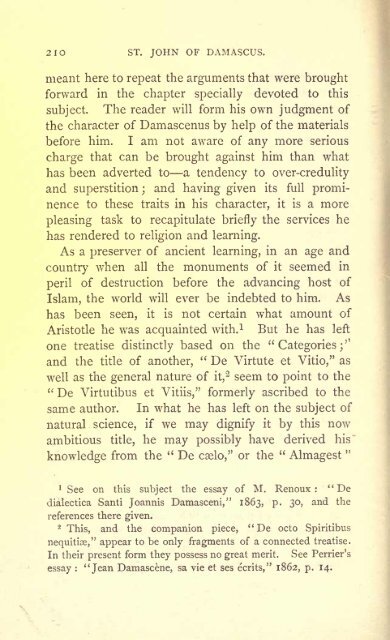st. john of damascus (676-749 - Cristo Raul
st. john of damascus (676-749 - Cristo Raul
st. john of damascus (676-749 - Cristo Raul
You also want an ePaper? Increase the reach of your titles
YUMPU automatically turns print PDFs into web optimized ePapers that Google loves.
"<br />
De<br />
"<br />
De<br />
"<br />
De<br />
"<br />
"<br />
"<br />
210 ST. JOHN OF DAMASCUS.<br />
meant here to repeat the arguments that were brought<br />
forward in the chapter specially devoted to this<br />
subject. The reader will form his own judgment <strong>of</strong><br />
the character <strong>of</strong> Damascenus by help <strong>of</strong> the materials<br />
before him. I am not aware <strong>of</strong> any more serious<br />
charge that can be brought again<strong>st</strong> him than what<br />
has been adverted to a tendency to over-credulity<br />
and super<strong>st</strong>ition; and having given<br />
its full promi<br />
nence to these traits in his character,<br />
it is a more<br />
pleasing task to recapitulate briefly the services he<br />
has rendered to religion and learning.<br />
As a preserver <strong>of</strong> ancient learning, in an age and<br />
country when all the monuments <strong>of</strong> it seemed in<br />
peril <strong>of</strong> de<strong>st</strong>ruction before the advancing ho<strong>st</strong> <strong>of</strong><br />
Islam, the world will ever be indebted to him. As<br />
has been seen,<br />
it is not certain what amount <strong>of</strong><br />
Ari<strong>st</strong>otle he was acquainted with. 1 But he has left<br />
one treatise di<strong>st</strong>inctly based on the "Categories;<br />
and the title <strong>of</strong> another, Virtute et Vitio," as<br />
well as the general nature <strong>of</strong> 2<br />
it, seem to point to the<br />
Virtutibus et Vitiis," formerly ascribed to the<br />
same author. In what he has left on the subject <strong>of</strong><br />
this now<br />
natural science, if we may dignify it by<br />
ambitious title, he may possibly have derived his<br />
knowledge from the<br />
caelo,"<br />
or the Almage<strong>st</strong><br />
1<br />
See on this subject the essay <strong>of</strong> M. Renoux :<br />
dialectica Santi Joannis Damasceni," 1863, p. 30, and the<br />
references there given.<br />
2<br />
This, and the "De<br />
companion piece, octo Spiritibus<br />
nequitke," appear to be only fragments <strong>of</strong> a connected treatise.<br />
In their present form they possess no great merit. See Perrier s<br />
essay : "Jean Damascene, sa vie et ses ecrits," 1862, p. 14.<br />
De
















